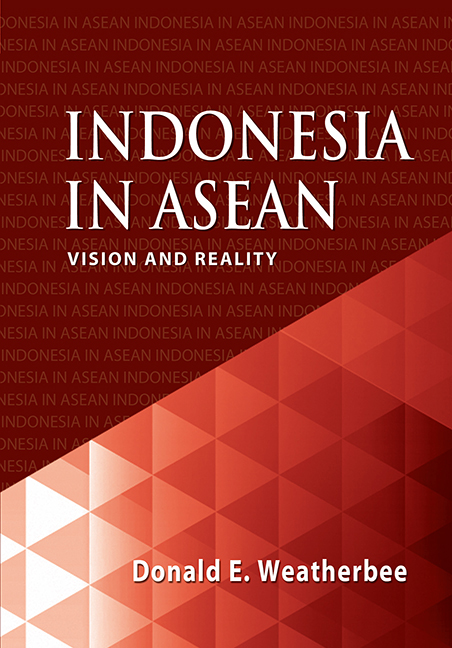Book contents
- Frontmatter
- Contents
- Editorial Note
- Acknowledgements
- About the Author
- Introduction
- I The Visible Indonesia
- II Indonesian Policy Foundations
- III Democracy in Indonesian Foreign Policy
- IV Islam in Indonesian Foreign Policy
- V Indonesia, ASEAN and Regional Political Stability and Security
- Conclusion
- Addendum
- End Notes
- References
III - Democracy in Indonesian Foreign Policy
Published online by Cambridge University Press: 21 October 2015
- Frontmatter
- Contents
- Editorial Note
- Acknowledgements
- About the Author
- Introduction
- I The Visible Indonesia
- II Indonesian Policy Foundations
- III Democracy in Indonesian Foreign Policy
- IV Islam in Indonesian Foreign Policy
- V Indonesia, ASEAN and Regional Political Stability and Security
- Conclusion
- Addendum
- End Notes
- References
Summary
Indonesia's newly recognized status as a democracy has qualitatively changed its international relationships. It can now claim a seat at the table with the liberal democracies of the world while posing as a role model for the less-than-democracies of its cohort in ASEAN and elsewhere in the developing world. The democracy that is being consolidated in Indonesia is a real democracy, not just electoral machinery rolled out at stipulated occasions to give an aura of legitimacy to essentially undemocratic governments. Indonesia is now one of 90 polities, out of 195, in the world that is ranked as “free” in Freedom House's annual classifications, and the only one in ASEAN. The criteria by which it is judged “free” include open political competition, respect for civil liberties, a significant independent civic life and an independent media. Acknowledging that the working of Indonesia's democracy has well-publicized problems of religious tensions, ethnic strife, and corruption — as do other democracies — the consensus is that, with halts and starts, the domestic political processes begun in 1999, by President Yudhoyono's second term, have resulted in a relatively stable democracy in which democratic values conform to the normative basis of the state: the Pancasila and the stipulations of the Indonesian constitution.
Accepting that Indonesia is a democracy and that Indonesia proudly flourishes its democratic credentials to the world, the question here is how the democratization of Indonesia has affected Indonesian foreign policy in terms of both its domestic base and its international interests and objectives. There is no question that Indonesia assiduously projects its democratic image to enhance its standing globally. Democracy has been part of Indonesia's new status in global multilateralism and its bilateral standing with liberal democratic communities. It is a consciously adopted foreign policy strategy which depends on the domestic political order. Foreign Minister Marty, in his first major address on taking office in 2009, praised his predecessor, Hassan Wirajuda, for the “democratization” of Indonesian foreign policy”.
- Type
- Chapter
- Information
- Indonesia in ASEANVision and Reality, pp. 21 - 36Publisher: ISEAS–Yusof Ishak InstitutePrint publication year: 2013

